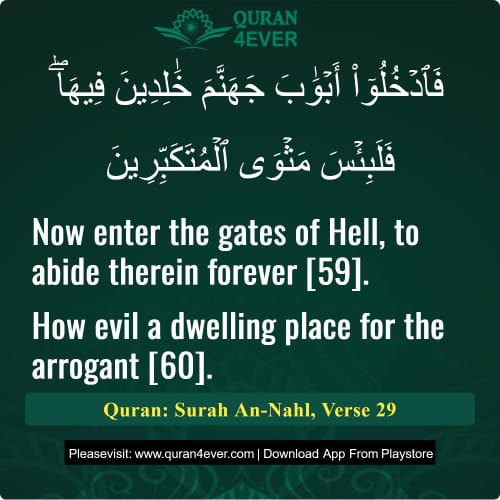
Transliteration:( Fadkhulooo abwaaba jahannama khaalideena feeha falabi'sa maswal mutakab bireen )
"Now enter the gates of Hell, to abide therein forever [59]. How evil a dwelling place for the arrogant [60]."
This verse confirms that eternal residence in Hell is reserved only for disbelievers. Even if a believer has committed serious and major sins, he will not remain in Hell forever. After due punishment and purification—if Allah wills—he will be removed from Hell and granted entry into Paradise.
This is a key point in Islamic theology that distinguishes between the fate of believers and disbelievers. The punishment of believers is temporary, while the punishment of disbelievers is eternal and absolute.
The verse ends by stating that Hell is an evil dwelling place for the arrogant, highlighting that pride and arrogance are among the major causes of a person’s downfall. Any pride shown by a human being is inherently false and sinful, because all greatness and majesty belong to Allah alone.
Especially dangerous is arrogance shown in opposition to the Prophet ﷺ or in rejecting divine guidance. Allah’s greatness and pride are part of His perfection, while human pride is usually based on illusion and ego, making it blameworthy.
This verse is both a warning against arrogance and a reminder of the humility required before Allah and His Messenger.
The tafsir of Surah An-Nahl verse 29 by Ibn Kathir is unavailable here.
Please refer to Surah Nahl ayat 28 which provides the complete commentary from verse 28 through 29.
(16:29) Go now, and enter the gate of Hell, and abide in it for ever.[26]” Evil indeed is the abode of the arrogant.
26. The (Surah An-Nahl, Ayat 28) and (Surah An-Nahl, Ayat 32), and several other verses in the Quran, clearly and definitely assert that immediately after death, souls suffer torment or enjoy peace in the world of Barzakh. The traditions use the word qabar (grave) metaphorically for this existence of the souls. This is the world in which souls enter immediately after death and will remain therein up to the Day of Resurrection. Yet the disbelievers of the traditions declare that after death souls will remain in a dormant state up to the time of Resurrection, and will neither feel any pain nor joy, nor will be conscious of anything at all. Obviously, this is a wrong opinion. For, according to (Surah An-Nahl, Ayat 28), just after death when the disbelievers will be conscious of the fact that they had been leading an evil life, they will try to make the angels believe that they had not done any evil deed. The angels will rebuke them at this boldness and will tell them that they shall have to go into Hell. On the other hand, according to (Surah An-Nahl, ayat 32), just after their death, the pious believers are welcomed by the angels and given the good news that they will enter into Paradise. Besides these verses, there is the mention of a dialogue between the angels and those Muslims, who did not migrate to Al- Madinah, after their souls were seized by the angels in (Surah An-Nisa, Ayat 97). Above all, according to (Surah Al-Momin, Ayat 45-46), the people of Pharaoh have been encircled by a torment and are exposed before the fire of Hell every morning and every evening. This will go on till the Day of Resurrection when they shall be sentenced to eternal torment.
In fact, both the Quran and the traditions present the same kind of picture of the condition of the soul after death till Resurrection. Death causes merely the separation of the soul from the body but does not annihilate it. The soul lives with the same personality that was formed by the different experiences and the mental exercises and moral activities it had in its worldly life in cooperation with the body. This nature of the consciousness, feelings, observations and experiences of the soul, during the waiting period, is similar to that in a dream. Just as a criminal sentenced to death suffers from mental torture on the eve of his crucifixion, in the same way the angels take to task the guilty as in a dream, torture it and take it to the horrible Hell in order to make it foretaste the impending torture. In contrast to this, the pure soul is welcomed by the angels and is given the good news of entry into paradise and is made to enjoy its pleasant breeze and smell, and to feel happy like the faithful servant who is invited to the headquarters to receive his reward. But this life in the world of Barzakh will suddenly come to an end on the second blowing of the Trumpet of Resurrection. When the guilty souls will again enter into their former bodies and muster in the Plain, they will cry in horror: Oh! woe to us! Who has roused us from our sleeping places? But the true believers will say with perfect peace of mind: This is exactly what the Beneficent had promised, and the Messengers had told the truth. (Surah Yaseen, Ayat 52).
As the guilty ones will be under the delusion that they had been lying in their death bed for an hour or so and had been roused from sleep. Those who were given knowledge and faith will say: According to the Record of Allah, you have remained after death till this Day of Resurrection and this is the same Day of Resurrection, but you did not know this. (Surah Ar-Room, Ayat 55-56).

For a faster and smoother experience,
install our mobile app now.
Related Ayat(Verses)/Topics